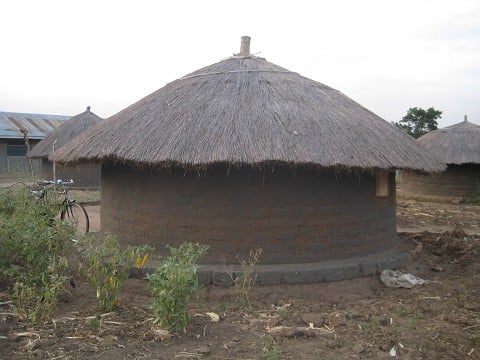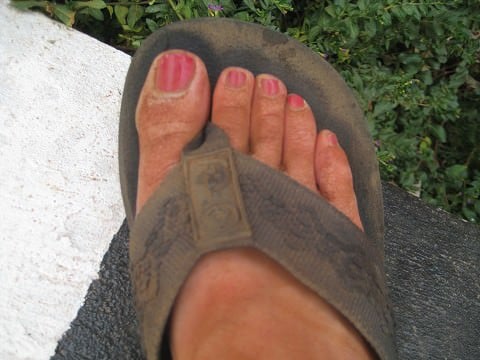 As I mentioned in Part II of the series, we considered ourselves fortunate to live in mud huts. Admit it, you have a little part of you that would like to live in a mud hut for at least a few days. ☺ African mud huts are actually fairly cool and we were grateful for an escape from the sun. The downside is that the roofs are thatched grass and that creates quite the habitat for snakes, mice, insects and of course, a lot of dust. We decided to pitch our tents inside the mud huts to protect us from malarial mosquitoes and any other creature that might roam in the night!
As I mentioned in Part II of the series, we considered ourselves fortunate to live in mud huts. Admit it, you have a little part of you that would like to live in a mud hut for at least a few days. ☺ African mud huts are actually fairly cool and we were grateful for an escape from the sun. The downside is that the roofs are thatched grass and that creates quite the habitat for snakes, mice, insects and of course, a lot of dust. We decided to pitch our tents inside the mud huts to protect us from malarial mosquitoes and any other creature that might roam in the night!It goes without saying that bathrooms and showers are really just three-sided bamboo structures that allow for a lot of small little onlookers! Apparently white backsides are rather entertaining for little eyes! The word for “white person” in Swahili is Mzunghu (pronounced mizz-un-gu) so it was common to hear “Mzunghu! Mzunghu!” as you squatted over the hole, doused yourself in a bucket bath, or really did just about anything. They were absolutely fascinated by us.
Nothing fascinated the Ugandan people, young or old, quite as much as watching us carry water. I have never realized just how important water is in daily life until I had to carry it ½ mile from the local spring. We had 10 liter jugs that we hauled back and forth each day to do laundry, bathe, and wash dishes. (We drank bottled water.) Ugandan women are exceptionally strong and carry their 20 liter jugs on their heads while also toting babies on their backs and veggies in their arms. We waddled across the field practically tortured with our 10 liter jugs in our hands. Safe to say we got quite a few laughs. I have never felt so weak or incompetent!
We opted to cook for ourselves each day and on the WR budget that usually consisted of beans and rice and more beans and rice. For variety we would throw in some eggs and on a good day we even splurged with some instant coffee! Who knew Nescafe could taste so good? Cooking dinner usually began around three with the starting of the fire and lasted most of the evening. Daily living takes so much longer out here and we could easily fill a day with hauling water, cleaning clothes and cooking meals.
 Most days the heat and sun are so intense by Noon that most of the official “ministry” would break for the afternoon and we would try to find a mango tree to sit under and stay cool. Days started early with either walks to the clinic to help with vitals and filling prescriptions or ministering in the neighboring IDP camps. We battled some of the spiritual oppression each afternoon with prayer and intercession and ended our days by the fire with funny stories and singing. All in all it is a simple life, yet somehow filling and peaceful as well.
Most days the heat and sun are so intense by Noon that most of the official “ministry” would break for the afternoon and we would try to find a mango tree to sit under and stay cool. Days started early with either walks to the clinic to help with vitals and filling prescriptions or ministering in the neighboring IDP camps. We battled some of the spiritual oppression each afternoon with prayer and intercession and ended our days by the fire with funny stories and singing. All in all it is a simple life, yet somehow filling and peaceful as well.
The children at Child Voice were never far away, nor were the local kids that were very curious! I would be hard pressed to find cuter kids anywhere in the world. They have a special way of stealing our hearts. African culture lends itself to excited dancing and singing and a deep love for the Lord.
I learned so much from these special people, but nothing greater than the deep reverence they have for God and their unwavering belief that the Lord has saved them and preserved them.








